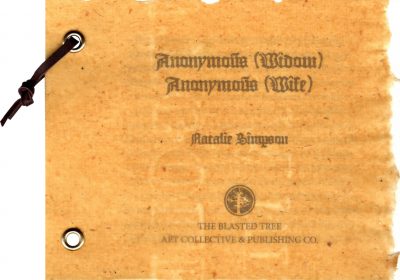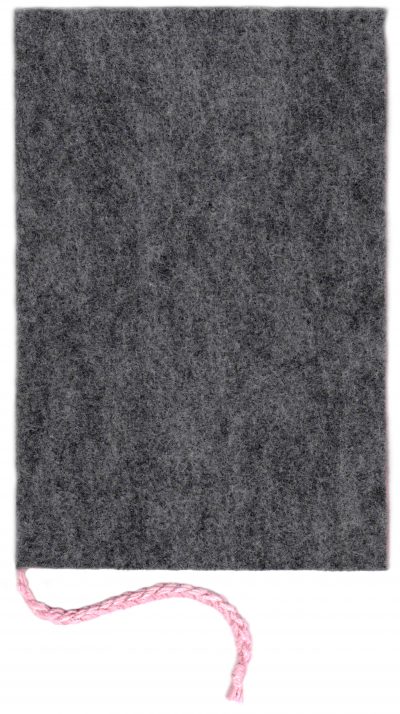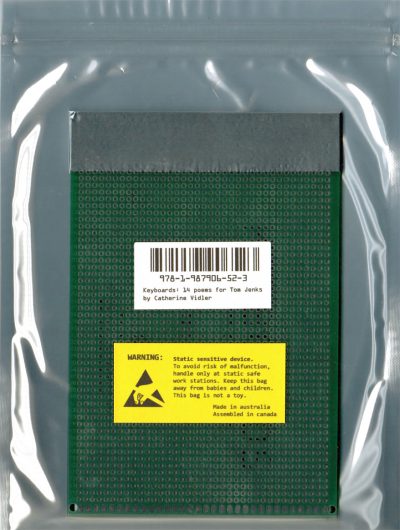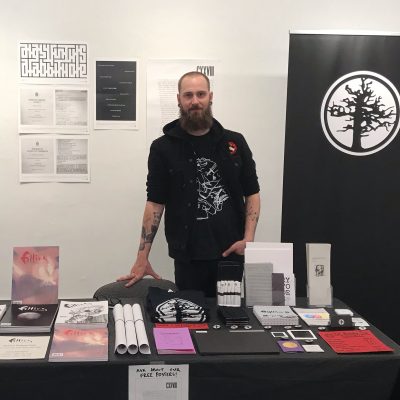
The Blasted Tree Publishing Co.
Mohkinstsis (Calgary), Peoples of Treaty 7 territory
Visit Website Shop NowFounder
Kyle Flemmer is an author, editor, and publisher from Calgary. He is currently undertaking his MA in English Literature at the University of Calgary where he is researching forms of computer-mediated poetry. He founded The Blasted Tree Publishing Co. in 2014, served as Managing Editor of filling Station magazine from 2018–2020, and has published chapbooks with Simulacrum, above/ground, No Press, and other small presses.
Tell us a bit about your press. How did you start? Who are your influences, in Canada and beyond? What is your mission?
The Blasted Tree is a small press promoting exceptional experimental writing by Canadian and international authors. It publishes all sorts of innovative work, including poetry and visual poetry, short fiction, drama, graphic narrative, creative nonfiction, and multimedia art, with a special focus on the physical embodiment of unique practices and perspectives. When I first started, my primary influences were active in Montreal’s underground zine- and art book-making communities, particularly those which intersected with the Anglo poetry scene around Concordia University. Over time, I’ve gravitated toward the “high production value on a shoestring budget” model of publication supplemented by the “give it all away” model online, putting out limited edition runs of art-forward print media while keeping all the projects accessible on the website.
I’m inspired by playful, inquisitive poets, daring book designers, boundary-pushing multimedia artists, and hack and slash DIY zine creators. I like to be shaken, awed, baffled, provoked — in short, I like to be thrown into uncharted literary territory — and I hope the things I publish stir a little of that in the people they reach.
What about small press publishing is particularly exciting to you right now?
I’m not sure how things were prior to my time, but I’ve seen a staggering interconnectedness fostered across national lines in the few short years The Blasted Tree has been active. Publishing felt so localized when I started. “What city are you from? Where are you based?” There’s this unspoken imperative to plant your flag somewhere, some place academics can cite in their bibliographies, some city you host readings and cultivate a roster of authors, which is best accomplished, of course, in Toronto or New York. Now the small press community feels truly international in a way that is profound without making a big deal of itself. I’m fortunate to interact with authors and publishers from around the world regularly, but it’s not that hard to pull off. There’s an easy necessity to it, like breathing. Don’t get me wrong; the poetry scene in Canada is pretty good, and our visual poetry and small press scenes are world class, but people drawn to mind-blowing poetics or innovative book artistry or even just great ideas don’t care about the ‘made in’ label so much as the vitality of the thing. Social media and international shipping have all but removed the obstacles between us, so I’d say the best thing about small press publishing is cooperating with people from all over.
How does your press work to engage with your immediate literary community, and community at large?
This is a tricky question for me because community engagement feels like my weakest area, which is a little embarrassing for a publisher to admit. Not for lack of trying though… The Blasted Tree has hosted parties and readings, we participate in markets and festivals and fairs (even helping to coordinate a few). I’ve consigned our stuff in local shops and stuffed free community library boxes full of goodies. Blasted Tree publications have even appeared in a few galleries and art book exhibitions. That said, it doesn’t feel like The Blasted Tree has a lot of presence in Calgary. It’s not the focal point of a community of artists and writers I thought it would grow into. My living room is not some hive of activity. It’s pretty much just me coordinating with one author at a time, working with modest means toward something wonderful.
The same can be said for our online presence. I post to social media very irregularly, and most of the content I put up documents the making of our chapbooks, rather than explicit promotion for the content. Most of my effort in that direction is spent on The Blasted Tree’s website, which fortunately does have an international readership. Recently, I’ve become more comfortable with the idea that The Blasted Tree doesn’t have to be more than it is. Having one foot in print and one in digital publishing leaves me with fewer resources than I’d like, but I’m invested in both worlds and don’t mind the idea of a slow burn, so far as getting out in front of people is concerned. The only way this enterprise can be sustainable for me is if it continues to grow organically, one exciting project, one new contributor, and one diehard reader at a time.
Tell us about three of your publications. What makes them special, needed, and/or unique?
The three projects below are indicative of the level of care taken in our design and material choices. The Blasted Tree pays special attention to these aspects of print publication, always seeking to reinforce creative content through judicious and appropriate design, attempting to push boundaries without distracting from the message.
How have the current multiple global crises impacted your work with the press?
There’s a lot to say here. At a practical level, crises make day-to-day operations more difficult. Shipping is slower, materials are more expensive and difficult to come by, attention and resources are needed elsewhere, brain fog and doomscrolling are difficult to escape, events and in-person collaboration have become impossible, and so on and so forth. More important than these inconveniences are how they’ve impact decision-making. I actually find it easier to make ethical, informed decisions when the pressure is on. When times are swell it’s almost too convenient to drive down to the fancy paper store and splash money on decadent materials. But when resources are scarce, when every trip out of the house must be calculated, then I’m motivated to put more thought into cost-effective, responsibly-made paper.
The same is true for selecting work to publish, production timelines, and expected outcomes. With public focus on these multiple crises, things have slowed down in the literary world, already a sluggish industry. The expectation to be ‘always on, always producing’ has diminished considerably, and as a result I’ve learned to take more time in selecting appropriate projects for the press, and in producing quality print publications. I find myself with a preference for strength over volume, and that’s overall a positive outcome, I think.

Anonymous (Widow) Anonymous (Wife)
Natalie Simpson
March 2020
Anonymous (Widow) Anonymous (Wife) is a hybrid list/erasure poem which names the 978 people identified as female in the Prosopography of Anglo-Saxon England, a database listing every person recorded in written sources in England from the sixth to eleventh centuries. By singling out female names and occupations, Simpson highlights how very little we know about historical women relative to their male contemporaries. These chapbooks are rivet-bound, covered with century-old mixed skin parchment-paper, and detailed with a deer-skin leather thong.

Rat Queen
Tyler Hayden
February 2020
Rat Queen is The Blasted Tree’s first foray into drama, a crass, tragi-comic play about two lab rats, dosed with LSD, joined at the tail, and abandoned to starve in their cage during the apocalypse. Rat Queen is Waiting for Godot beyond the pale, a mammalian romp through lust, boredom, hunger, horror, and hallucination. The script was printed on pink paper and bound into red card stock covered in grey felt with a waxed yarn rat tail, evoking the pelt of a flayed rat.

Keyboards: 14 poems for Tom Jenks
Catherine Vidler
September 2019
Keyboards: 14 poems for Tom Jenks is a series of visual poems composed of glitching textual artifacts, an array of digital ephemera unraveling across the page like code through a corrupted processor. As the series go on, each poem invading and overwriting the last, it devolves into rich fields of pixelated letter forms. Keyboards has been hand-bound in blank prototyping circuit boards and aluminum tape, then sealed in translucent anti-static bags normally used to ship computer hardware.
